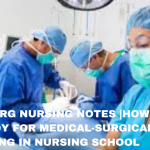Nursing is a field that demands continuous learning and adaptation. As healthcare evolves, so must the skills and knowledge of nurses. This guide delves into strategies for enhancing learning and professional growth in nursing, ensuring nurses are well-equipped to meet the challenges of modern healthcare.
- Continuing Education
Continuing education is crucial for nurses to stay current with the latest healthcare advancements. Through ongoing learning, nurses can keep up with the latest trends, treatments, and technologies in healthcare. This might involve taking courses on new healthcare laws, emerging diseases, or innovative treatment methods. Continuing education ensures that nurses maintain their licenses and certifications, but more importantly, it fosters a culture of lifelong learning. By regularly engaging in educational activities, nurses can continually enhance their skills, improve patient care, and advance in their careers. Online courses, seminars, and conferences are excellent ways to access new information and learn from leading experts in the field.
- Pursuing Advanced Degrees
Advanced degrees play a crucial role in a nurse’s career development. Programs like the RN-BSN and MSN Leadership and Administration focus on developing clinical and leadership skills. The new MSN Leadership and Administration & MBA Dual Degree, in particular, offers a unique combination of nursing leadership and business management education. This dual degree prepares nurses for high-level executive roles, blending healthcare management with broader business strategies. Such advanced education not only boosts clinical knowledge but also equips nurses with the skills needed to lead and innovate in healthcare settings.3. Networking and Professional Organizations
Networking and involvement in professional organizations are key strategies for professional growth in nursing. These organizations provide a platform for nurses to connect with peers, share experiences, and learn from each other. They often offer access to exclusive educational resources, career development workshops, and conferences. By networking, nurses can learn about new job opportunities, stay abreast of industry trends, and gain insights into different areas of nursing practice. Professional organizations also advocate for the nursing profession, influencing healthcare policies and standards. Active participation in these groups can lead to leadership roles within the organizations themselves, further enhancing a nurse’s professional profile and impact in the field.
- Mentorship Programs
Mentorship is a powerful tool for professional development in nursing. Engaging with a mentor provides guidance, support, and insight into the nursing profession. Mentors can help navigate the complexities of the healthcare system, offer career advice, and share valuable experiences. For new nurses, a mentor can be a source of encouragement and knowledge, helping them adjust to the demands of the profession. For experienced nurses, mentors can offer guidance on career advancement and specialization. Mentorship relationships can be formal, through programs organized by employers or professional organizations, or informal, developed through personal connections. Either way, these relationships can significantly impact a nurse’s career trajectory, providing a sounding board and a source of professional wisdom.
- Research and Publication
Participation in research and publication is an excellent way for nurses to contribute to the advancement of their field. Engaging in research projects can enhance critical thinking and analytical skills, and publishing findings helps disseminate new knowledge. Nurses can collaborate on research projects within their healthcare institutions or through academic programs. Writing articles for nursing journals or presenting at conferences not only contributes to the profession but also helps nurses build a strong professional reputation. This involvement in research and scholarly activities demonstrates a commitment to evidence-based practice and continuous learning, key components of professional growth in nursing.
- Specialization and Certification
Pursuing specialization and certification in specific areas of nursing can significantly enhance a nurse’s career. Specializations, such as in pediatrics, geriatrics, or emergency nursing, allow nurses to focus on areas they are passionate about. Earning certifications in these specialties demonstrates a high level of knowledge and expertise, making nurses more valuable to their employers and more effective in their roles. These credentials often require additional education and clinical experience, furthering a nurse’s learning and professional development. Specialization can lead to new job opportunities, higher salaries, and greater job satisfaction as nurses become experts in their chosen fields.
- Technology and Digital Literacy
In today’s healthcare environment, technological competence is essential. Nurses must be proficient in using electronic health records, telehealth platforms, and other digital tools. Staying updated with these technologies ensures efficient and accurate patient care. Digital literacy also includes understanding how technology can be used to improve healthcare delivery, patient education, and data management. Nurses can enhance their digital skills through workshops, online courses, and hands-on practice. Being technologically savvy not only improves clinical practice but also prepares nurses for roles that require managing or implementing healthcare technology solutions.
- Leadership and Management Skills
Developing leadership and management skills is crucial for nurses aspiring to take on administrative roles. Programs like the MSN Leadership and Administration equip nurses with the skills needed to lead teams, manage healthcare operations, and make informed policy decisions. Leadership skills involve effective communication, team management, conflict resolution, and strategic planning. Nurses can develop these skills through formal education, mentorship, and taking on leadership roles within their work environment. Such skills are invaluable for advancing to higher positions within healthcare organizations, where nurses can influence practice and policy at a broader level.
- Work-Life Balance
Maintaining a healthy work-life balance is vital for long-term career satisfaction and personal well-being in nursing. The demanding nature of nursing can lead to burnout if not managed properly. Strategies for a healthy balance include setting boundaries between work and personal life, practicing self-care, and managing time effectively. Prioritizing physical and mental health through regular exercise, hobbies, and relaxation techniques can significantly reduce stress. Nurses should also take advantage of their time off to recharge and spend time with loved ones. Achieving work-life balance is crucial for maintaining enthusiasm and passion for the nursing profession.
- Lifelong Learning Mindset
Adopting a lifelong learning mindset is essential for continual growth in nursing. This mindset entails being open to new experiences, seeking out learning opportunities, and adapting to changes in the healthcare landscape. It’s about viewing challenges as opportunities for growth and being proactive in seeking knowledge and skills. This approach keeps nurses engaged, motivated, and ready to tackle new challenges. Whether through formal education, such as pursuing advanced degrees like the RN-BSN or MSN, or through informal learning experiences, a commitment to lifelong learning is key to a fulfilling and successful nursing career.
Final Words
By embracing these strategies, nurses can enhance their learning and professional growth, ultimately leading to better patient care, personal fulfillment, and career advancement. Each strategy offers unique benefits and, when combined, provides a comprehensive approach to professional development in the dynamic field of nursing.










